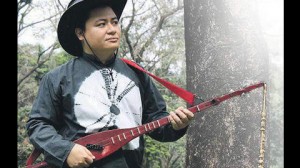Diwa de Leon bends the two strings of this traditional instrument to make new music
Musician Diwa de Leon’s work on Auraeus Solito’s indie film, “Busong,” won for him the best sound and best musical score trophies in the Directors’ Showcase section of the Cinemalaya film festival last year.
While these gave him pride and a sense of fulfillment, De Leon said one thing would give him deeper satisfaction: Pushing the hegalong—a two-stringed T’boli boat lute/guitar—into present-day consciousness, and making it relevant in modern music genres.
“I envy India [for] the sitar, which is closely associated with its culture. Japan has the shamisen. Ang gusto ko, pag sinabi mong Pilipinas, hegalong ang unang papasok sa isip mo,” De Leon told the Inquirer at the recent launch of his album, “Memories on Two Strings,” at the Conspiracy Garden Café in Quezon City.
To introduce the ethnic instrument to the public, the 31-year-old artist has uploaded on YouTube original hegalong compositions infused with computer-generated rock, electronic, and ambient sounds. De Leon called the endeavor his “Hegalong Project.”
“It’s about embracing technology and, at the same time, staying true to our roots and culture,” he said.
De Leon’s YouTube channel, “mangdiws,” currently has almost 4,000 subscribers and 2.7 million video views.
How was this fan base built?
Interestingly, it was De Leon’s addiction to video games that helped him attract followers. He remixed the themes of such games such as “Super Mario Bros,” “Castlevania,” “Final Fantasy” series and “The Elder Scrolls V: Skyrim.”
“Minsan, kailangan ng popular approach,” he said. “The video game remixes attracted a lot of listeners, including foreigners. Eventually, they got curious about the hegalong and the rest of my music.”
Based on comments like, “I’ve never heard of this instrument before but it sounds great,” De Leon feels he’s been successful in “propagating the gospel of the hegalong.”
Experiment
This virtual love affair started in 1993, when he was a freshman at the Philippine High School for the Arts. He saw Joey Ayala playing the instrument and was instantly enamored with its unique “twangy” sound.
The hegalong is not mass-produced or common. Fortunately, his father, Felipe de Leon Jr., chair of the National Commission for Culture and the Arts, had once traveled as a cultural researcher around the Philippines to record and document indigenous music. It was his father who gave Diwa his very first hegalong about 10 years ago.
Classically trained in both the violin and guitar, De Leon said playing it was a breeze. The challenge was creating something out of such a limited instrument.
At first, he played the hegalong the traditional way (rhythmic and chordal) with his band Makiling. Recently, he found himself wondering, “Hanggang dito na lang ba ang hegalong?”
De Leon decided to let go of his traditionalist inhibitions. He started experimenting, first by bending the strings as one would when playing blues on guitar. Then he modified the scale and provided additional tunings, so it could handle more complex pieces.
(He draws the line at using any special effects that will alter the hegalong’s natural sound.)
Versatile
The result, De Leon said, was a more versatile instrument that can play a wider spectrum of music, old and new. And he proved just that during the launch, where he played 13 songs from his 25-track album.
Using a hegalong he got from the T’bolis of Lake Sebu in South Cotabato, De Leon filled the venue with a cocktail of sounds ranging from electronic and rock-laden to the mystical and meditative. He threw in a smattering of blues, pop, hip-hop, even heavy metal and Bollywood-flavored beats.
De Leon said playing the hegalong is “therapeutic” for him. His audience could see that, as he performed with eyes closed, savoring the sound. After each number, he broke into a smile.
Standout pieces in the album: “Stormy Nights,” “Evolve,” “Turbo,” “Orchids in Spring,” “Samosa,” “Fly,” “Japanese Garden,” “Rising Sun” and the carrier single, “Moonrise,” featuring Cooky Chua on vocals.
Moving forward
Asked how he thought traditionalists would react if they witness his hegalong-bending ways, De Leon laughed and said, “I’m sure they’ll cringe!”
He stressed that in order to move forward in any creative field, one couldn’t be bound by the rules. “If you know you can do more, why not do it?”
He said he respects advocates of cultural preservation but that, personally, his goal is growth and evolution. “I want to always be moving forward.”
(“Memories on Two Strings” is available online at https://www.cdbaby.com/cd/diwadeleon2)
